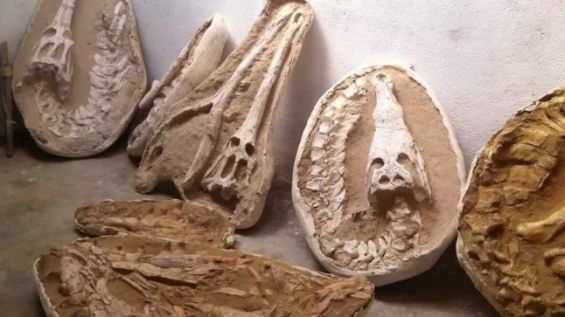Customs authorities in the Lavacolla airport, in Spain, seized, Sunday, a number of fossils found in the luggage of a man who was holidaying in Morocco.
According to Cadena Cope, a Spanish radio station, the man in question was travelling with seven fossils from Morocco, without having the needed documents to move them abroad proving that he would have smuggled them.
After he was heard by the airport Guardia Civil agents, the man said that he bought the fossils from different and separate shops when he was in Morocco. When asked about the receipts, the man said that he did not have them.
The same source reported that the authorities would request the opinion of their counterparts in Morocco before proceeding with the case, adding that the man could face charges related to the smuggling of geological heritage.
Fossils and animals smuggled from Morocco have been a worrying topic for researchers and those interested in preserving the country’s heritage. In the recent years, Moroccan fossils sold outside the country made headlines several times, raising questions about a «black fossil market» that threatens the country’s geological heritage.
Knowing the real value of fossils
The practice was denounced by Moroccan ichnologist Abdelouahed Lagnaoui who admits that the work of researchers and other scientists in the Kingdom is hindered by such practices. «In some countries, such as Germany, there are laws that force locals or people who find or stumble upon fossils and other valuable objects to hand them to the closest university», he explained.
«Similar laws and instructions help universities and labs better their research but unfortunately it does not work the same way in Morocco», he argued.
Lagnaoui, from the department of Paleontology and Stratigraphy in the Kaza Federal University in Russia, believes that some of those who sell fossils in Morocco are unaware of their real value. Meanwhile, he stressed that those who buy these precious items «take advantage of the situation of locals in some parts of the country where they have no other resources than fossil collecting and selling».
According to the researcher, Moroccans must think of ways of protecting their geological heritage. One way is through «creating geology parks in the regions and areas where people and researchers find fossils or meteorites quite often, such as Tinghir, Tata and Zagora».

«Currently, Morocco is home to only one Geo Park in Maghoun and I believe that having more places like this one will help protect this heritage, especially because these parks will include specialists and guards who will be tasked with protecting these treasures», he stressed.
Nevertheless, Lagnaoui believes that education and awareness are also keys in the fight against fossil smuggling. «Raising awareness and letting the local population know about the importance of these fossils, by organizing workshops and conferences is also a solution», he insisted.
Lagnaoui who held, alongside other researchers, conferences in the region of Doukkala indicates that locals must understand that they are also concerned when it comes to preserving fossils.
«In the year 2016, I visited a site in Imilchil with a group of researchers. There, we found thatsome fossils were part of a man’s land and the latter used the rocks to build a house. We sat with him and convinced him that what he had on his land was very valuable (…) One year later it turned out that he did not touch the site. This shows that communication can work sometimes».
Fighting aginst fossil smuggling
But to Abderrahim Mohib, an archaeologist at the Ministry of Culture and co-director of the scientific mission which directs archaeological research in the Casablanca area, fossil smuggling is not something new. «The problem has been going on for years, despite the laws and restrictions set by the country», he explained.
«We must continue to fight against fossil smuggling», he argued, adding that «the Directorate of Cultural Heritage had already started, a few years ago, a training cycle for Moroccan customs officials so that they can know which pieces cannot leave the territory without authorization».
However, Mohib believes that the police, the royal gendarmerie as well as local inhabitants who live near excavation sites must also undergo the same trainings.
Fossil smuggling, however, can have other serious consequences, especially when it comes to environmental degradation. «Random extractions are not done in environmentally-friendly ways : sometimes we leave materials that are incompatible with this environment. When we destroy layers we can cause landslides», he concluded.




 chargement...
chargement...












